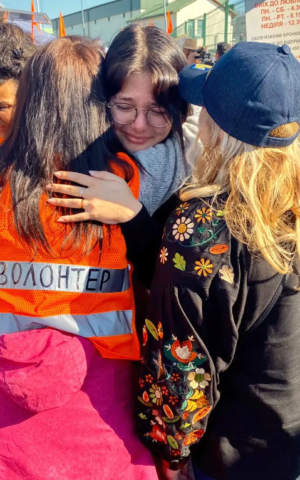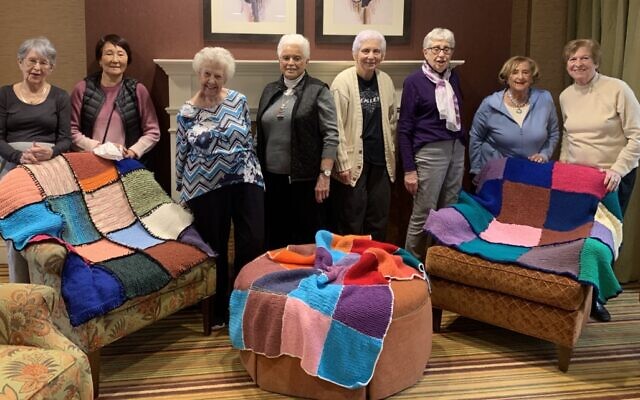Recent Ukrainian Local Refugees May Face Deportation
The status of those Ukrainians who were settled here by the Federation and local synagogues may be in jeopardy.
For this year’s anniversary of the Russian invasion of Ukraine in 2022, a small group of residents at the senior living community of Sunrise at Huntcliff Summit were knitting. With stiff and not always very responsive hands that sometimes had difficulty making the stitches, they created the colored squares that, in time, were joined together in three blankets for Ukrainian refugees.
No one in the group, which was comprised of Jewish and non-Jewish residents, had any personal connection to those Ukrainians who might have received a little extra warmth from their gift, but it didn’t matter.
Grace Benator, who worked on the project, says it’s just part of what the residents have been doing for at least a half dozen years for patients at Northside Hospital. They knit scarves for infusion patients, caps for those who have had chemotherapy, and sweaters for infants in the neonatal unit.
“It’s our mitzvah. It feels good doing good. Keeping people warm in one way or another over the years. First all those patients at Northside Hospital and now the people of Ukraine.”
Jewish social service agencies in Atlanta were quick to take up the challenge when the Russians invaded Ukraine on Feb. 24, 2022. Eric Robbins, CEO at the Jewish Federation, began a Ukraine Emergency Fund a day after the invasion and traveled to Poland with other Federation leaders to see firsthand in Medekya, at the Polish Ukraine border, the humanitarian crisis that was developing.

“We are all here to do whatever we can,” he said at the time, “to fund and support the massive humanitarian effort underway to save Ukrainian Jews and other displaced Ukrainians. We are committed to returning home and telling American Jews a story we never imagined would happen again.”
In the last year the Federation in Atlanta has raised more than $2.7 million from over 1,500 individual donors, including those ladies at Huntcliff Summit.
During the first months of last year, the Jewish Federation of Greater Atlanta set up a program called AURA, for Atlanta Ukrainian Relief Assistance, which provided $200,000 to help settle the new arrivals.
The program was part of an early initiative to raise funds by federations and the Shapiro Foundation in 18 Jewish communities in the United States and Canada to help displaced Ukrainians.
The director of the program at JF&CS, Zane Blechner, credits the generous funding that the program provided for quickly getting Ukrainian families on their feet again. Blechner said it only took two days to fill up the program.
Sixty early arrivals from Ukraine, who came here as what the Immigration Service calls “humanitarian parolees,” were signed up for the program. That means that some can only stay here as little as a year. Still, area synagogues provided furniture and other living essentials. Federation money paid for housing. The aggressive resettlement program has meant that, after almost a year, according to Bleckner, about 75 percent of them have work permits and have jobs.
“One of the ways that we measure how things are going is self-sufficiency. And three quarters of our families are completely self-sufficient. The ones that are not self-sufficient, the only reason why they’re not, is because there were delays in the work permits coming.”
But some of those new residents may be in danger of deportation. In a letter dated Feb. 28, three major Jewish organizations wrote to the Department of Homeland Security on behalf of 20,000 Ukrainians that are in the United States as “parolees.”
The Jewish Federations of North America, the Hebrew Immigrant Aid Society and the Network of Jewish Human Service Agencies asked the federal government to renew their parole status in a timely manner.
“Together, our agencies have risen to meet the needs of the thousands of Ukrainians seeking refuge in the United States,” the letter said, “but we are deeply concerned about significant challenges that will negatively impact their status.”
The letter also calls for the continuation of other government benefits and an extension of Temporary Protected Status for Ukraine, which make certain that Ukrainian nationals, who were in the United States before the start of war, can remain here without fear of deportation.
At JF&CS, Blechner is hopeful that all the good work that the community has done, including those blankets that came from the ladies who knitted them at Huntcliff Summit, will not be undone.
“The government has not given us guidance yet. Clearly these people can’t go home to Ukraine. But our government tends to wait until the last second before making a decision.”
[UPDATE since publication]: The Department of Homeland Security announced a process for the extension of parole for Ukrainians who were given 1-year parole and who entered the United States between Feb. 24 and April 25 of last year.
Additional details, according to the press release:
- DHS will consider Ukrainian nationals and immediate family members who were paroled, on a case-by-case basis, before Uniting for Ukraine for an extension of the parole period and employment authorization, if applicable.
- While DHS will consider Ukrainians on a case-by-case basis, we believe, based on the information available at this time, that CBP will automatically issue new I-94s to Ukrainians who are approved for re-parole.
- The extension will be a one-year extension to align their parole period with the two-year parole provided to Uniting for Ukraine parolees. DHS expects this process to take around four weeks.
- This process does not “impact” other benefit requests including those who have applied for TPS, been granted TPS, or applied for asylum.
- Senior Living
- Community
- Bob Bahr
- Russian invasion of Ukraine
- Sunrise at Huntcliff Summit
- Refugees
- Grace Benator
- northside hospital
- Eric Robbins
- jewish federation
- Medekya
- Atlanta Ukrainian Relief Assistance
- Shapiro Foundation
- Zane Blechner
- JF&CS
- Department of Homeland Security
- Hebrew Immigrant Aid Society
- Network of Jewish Human Service Agencies
- Temporary Protected Status




comments